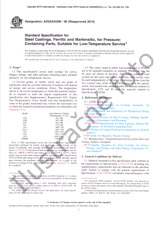Potrebujeme váš súhlas na využitie jednotlivých dát, aby sa vám okrem iného mohli ukazovať informácie týkajúce sa vašich záujmov. Súhlas udelíte kliknutím na tlačidlo „OK“.
ASTM D4809-18
Standard Test Method for Heat of Combustion of Liquid Hydrocarbon Fuels by Bomb Calorimeter (Precision Method)
NORMA vydaná dňa 1.7.2018
Informácie o norme:
Označenie normy: ASTM D4809-18
Poznámka: NEPLATNÁ
Dátum vydania normy: 1.7.2018
Kód tovaru: NS-897152
Počet strán: 10
Približná hmotnosť: 30 g (0.07 libier)
Krajina: Americká technická norma
Kategória: Technické normy ASTM
Kategórie - podobné normy:
Anotácia textu normy ASTM D4809-18 :
Keywords:
aviation turbine fuels, bomb calorimeter, heat of combustion, hydrocarbon fuels,, ICS Number Code 75.160.20 (Liquid fuels)
Doplňujúce informácie
| Significance and Use | ||||||||||||||||||||||||||||
|
5.1 The heat of combustion is a measure of the energy available from a fuel. A knowledge of this value is essential when considering the thermal efficiency of equipment for producing either power or heat. 5.2 The mass heat of combustion, that is, the heat of combustion per unit mass of fuel, is measured by this procedure. Its magnitude is particularly important to weight-limited vehicles such as airplanes, surface effect vehicles, and hydrofoils as the distance such craft can travel on a given weight of fuel is a direct function of the fuel's mass heat of combustion and its density. 5.3 The volumetric heat of combustion, that is, the heat of combustion per unit volume of fuel, can be calculated by multiplying the mass heat of combustion by the density of the fuel (mass per unit volume). The volumetric heat of combustion, rather than the mass heat of combustion, is important to volume-limited craft such as automobiles and ships, as it is directly related to the distance traveled between refuelings. |
||||||||||||||||||||||||||||
| 1. Scope | ||||||||||||||||||||||||||||
|
1.1 This test method covers the determination of the heat of combustion of hydrocarbon fuels. It is designed specifically for use with aviation turbine fuels when the permissible difference between duplicate determinations is of the order of 0.2 %. It can be used for a wide range of volatile and nonvolatile materials where slightly greater differences in precision can be tolerated. 1.2 In order to attain this precision, strict adherence to all details of the procedure is essential since the error contributed by each individual measurement that affects the precision shall be kept below 0.04 %, insofar as possible. 1.3 Under normal conditions, this test method is directly applicable to such fuels as gasolines, kerosines, Nos. 1 and 2 fuel oil, Nos. 1-D and 2-D diesel fuel, and Nos. 0-GT, 1-GT, and 2-GT gas turbine fuels. 1.4 Through the improvement of the calorimeter controls and temperature measurements, the precision is improved over that of Test Method D240. 1.5 The values stated in SI units are to be regarded as standard. No other units of measurement are included in this standard. 1.6 This standard does not purport to address all of the safety concerns, if any, associated with its use. It is the responsibility of the user of this standard to establish appropriate safety, health, and environmental practices and determine the applicability of regulatory limitations prior to use. 1.7 This international standard was developed in accordance with internationally recognized principles on standardization established in the Decision on Principles for the Development of International Standards, Guides and Recommendations issued by the World Trade Organization Technical Barriers to Trade (TBT) Committee. |
||||||||||||||||||||||||||||
| 2. Referenced Documents | ||||||||||||||||||||||||||||
|
Odporúčame:
Aktualizácia zákonov
Chcete mať istotu o platnosti využívaných predpisov?
Ponúkame Vám riešenie, aby ste mohli používať stále platné (aktuálne) legislatívne predpisy
Chcete vedieť viac informácií ? Pozrite sa na túto stránku.




 Cookies
Cookies
